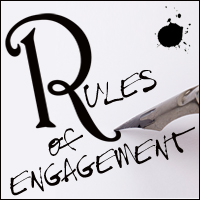.
 A blog for fiction writers and impending writers. An editor’s perspective.
A blog for fiction writers and impending writers. An editor’s perspective.
• Next post • Previous post • Index
Simple, But Exciting
(Introducing a novel’s three essential components.)
If I could distill the fundamentals of potentially great storytelling, my advice would be this: Keep it simple, but exciting…exciting, but simple.
While such advice may seem paradoxical (“Paint it black, but paint it white.”) you’ll find a marvelous co-dependency at play in writing a novel that: 1) moves the story forward with clear, comprehensible language, without confusing or unnecessary intrusions, and; 2) imparts a breathlessness, a passion, a cerebral metamorphosis that transforms the reader’s reality into a fictional realm of your choosing.
One manages such duality by keeping: 1) the fundamentals simple, and; 2) your voice exciting.
Simple: The mechanics and structure of your writing, the clarity of your language. (Specifically, syntax, semantics and grammar*.) Note that simple doesn’t mean uninteresting or brief—nothing synopsized, summarized or truncated—but rather articulate and concise.
Exciting: The unique personality of your style and voice, the ebb and flow of your journey (that is, the structure of your plot), your joie de vivre. Your subtle—but oh-so-witty—nuance. Your tantalizing dialogue. (See Exciting, but Simple. Also see Dialogue.)
Even those writers who attempt to climb (metaphorically speaking) the Mount Everest of epic adventures or those who navigate the Pan’s Labyrinth of complicated plots, the basic mechanics of fiction remain fundamentally simple: Write in clear, precise sentences. (That’s Rule #7, by the way.) Communicate to your reader in intelligent thoughts, carefully constructed, while providing a constant, continual procession of relevant information. Don’t stuff various, complicated ideas into a single sentence. Give yourself permission to expand complex ideas into multiple sentences or paragraphs.
Think of writing a novel as being similar to a long trek through the Sahara. As a reader, I’m following the trail you’ve intentionally set out on page one. I must be able to follow (e.g.; comprehend) each footstep you take along the way. A misplaced thought or a convoluted sentence will give me pause. What did you mean? A muddled page and I may be stymied. A misplaced or badly written chapter and now I’m lost in the arid wastelands. Where am I? Which way did you go? Lose readers midway through that proverbial desert and they’re likely gone for good.
My advice? Don’t get deviously clever or snarkingly cute with readers. Don’t withhold necessary information or keep secrets—intending a sleight of hand later in the story. Yes, your characters can be mysterious, but no, your prose shouldn’t be. Do not write under the influence of an advanced thesaurus. Do not assume readers will meticulously ponder your words attempting to comprehend your subliminal brilliance, your existential aura, your interpretive, Nureyev-like rond de jambe. Sure, your plot can be multi-layered, but not your innuendo. Maintain a precise, lucid writing style. Once again—for emphasis!—write in clear, precise sentences.
Three Simple, Necessary Components
We’ll utilize three necessary components to successfully navigate a story—and we’ll continually weave these elements throughout our novel, like the spiraling filaments in a thread. New writers and first drafts (from experiened writers) often concentrate on building a plot. It makes sense — you want to know where you’re going and how to get there. But don’t neglect scene-setting and character-development, aspects of a novel that are no less important than the plot. (Personally, I think character-development may be more important. Just one guy’s opinion.)
And so, in no particular order, or of no particular importance:
• Scene-Setting. As a reader, I want to be grounded early in each new chapter or scene. Give me a glimpse of where I am, and who I’m with and, if appropriate, when. (After dark? Before lunch? Late autumn? 1947?) Depending upon one’s writing style, setting a scene can be elaborate enough to fill several pages (a la George R.R. Martin), or as sparse as a few suggestive words. For instance:
I’d spent half the night searching in vain for Patrick McMartin. I walked into Charlie’s ramshackle Bar & Billiards a little before noon. The place smelled like old cigarettes and older sweat. You know, the kind of establishment where patrons paid in dimes and quarters, where cockroaches and winos came to die.
Meaning that we’re not obliged to fill pages and pages with unnecessary minutia. As my old granny used to say, “You don’t need to eat the whole pig if all you want is a slice of bacon.” So it’s okay to impart juuuuust enough information to ground readers in a scene, to establish the where and when, perhaps the how or why—and to reveal any pertinent changes that might have transpired between the previous scene and this one. If the current location, time, characters present (…etc.) are similar/identical to the previous scene, then additional scene-setting may be minimal or unnecessary. Your job is simply to be sure that readers remain grounded in the reality of each particular moment. (For more details, see Scene-Setting.)
• Character Development. Give readers enough initial information to identify (or at least tease) the relevant strengths and weaknesses of every major character. Not all at once, of course, but after giving readers an initial visual (or emotional) rendition, continue to reveal additional quirks and idiosyncrasies, little bits of nuance here and there throughout the novel. Creating memorable characters often relies on highlighting subtleties—physical, emotional, psychological, unusual—all at an appropriately opportune time.(For more details, see Character-Development.)
Just remember (and this is important enough to become a new rule) why people read fiction. Thus, Rule #13: Readers don’t read to find out What Happens. They read to find out What Happens to Whom. So don’t skimp on the whom part. Proper character development is essential.
• Plot Development. Reveal essential information that continually builds or strengthens your plot. Keep pushing the plot forward, either aggressively or subliminally, but constantly toward an inevitable conclusion of your design.
Note that, in each scene you write, you’ll combine elements of scene-setting, plot development and character development. Include nothing else. Seriously. If you find yourself writing material that doesn’t 1) further the plot, 2) further develop a character or, 3) ground the reader in time and place, those scenes probably don’t belong in your novel. (And if those scenes somehow feel intrinsically important to the story, look closely—they’re likely touching upon one of the above ingredients.)
These three key elements, by the way, comprise Rule #5: Continually scene set, character build or move the plot forward. In novel writing, nothing else matters.
Okay, so here’s a brief hypothetical:
Barnaby awoke before dawn, shivering beneath the insufficient weight of a blanket that smelled of manure and wet straw. The frigid air lay heavy with smoke drifting from a myriad of scattered campfires that burned in the meadow. He gazed upward through the misty tendrils, into a coal black winter’s night. High amid the heavens, he could see the constellation Orion. The
hunter.
…Come daylight, he knew, they would all become hunters.
He could hear a distant murmur of sleepless men, of braying horses. Somewhere in the tall grass, a young soldier sobbed. Even though he’d slept, Barnaby instinctively sensed dawn’s approach—soon the drums and bugles would beckon the war, and with its arousal, an unmitigated savagery would descend upon the brigade. Before sunset, many of those stirring restlessly around him would lay dead.
Not long ago, he might have wept at the thought of the carnage that morning would bring. But staring into the heavens, he wished for only solace. He longed for an eternity absent of fear, of hatred, of misery. For the first time since the fighting had begun, Barnaby found himself anticipating the absolute surrender of death, and relished its embrace.
In the above paragraphs we find a piecemeal semblance of scene-setting and character development, although not much plot. Yet by the end of the passage, we infer a battle’s brewing (basic plot development) and, if properly scene-set, we suspect our character to be a soldier of some bygone era. Campfires. Horses. Bugles. Even by the discreet choice of names—Barnaby—the writer implies a subliminal clue. No, we don’t know which war…but we assume we’ll be told fairly soon and, if the writing moves us, we’re willing to wait. Nor do we have a clear physical description of Barnaby (our protagonist we presume, although still uncertain)—and yet we’ve glimpsed the lost fear in his soul. Another important character trait.
By juxtaposing well-considered snippets of information, each sentence becomes an integral piece of an enormous puzzle, yet none of the overall picture which will be revealed in haste. The writer utilizes only those pieces that properly fit, and has already begun interlacing individual filaments (of plot, character and grounding) that will eventually weave into a narrative tale. We may not know key elements of the character until far into the novel. We’re learning about this man piece by piece. We may not learn about the writer’s true intent in telling his story—perhaps not the war itself, but rather a young man’s journey to find himself, through various aspects of fate. The writer’s only begun to build a mystery of voice, of plotting, and yet each sentence is precise and methodical, like so many footprints in the sand, one after another after another in meticulous formation toward an inevitable conclusion.
One last note: When is simple too simple? When simple becomes passive. So keep your simple sentences active. (See Active Voice.) For instance:
Passive: John was sleeping. (Simple? Yes. Exciting? No.)
Active: John’s snoring reverberated through the house with the fury of an approaching thunderstorm. (Better.)
Remember: Simple, but exciting.
.
*Syntax: The intentional arrangement of words and phrases to create well-formed (that is articulate and easily comprehensible) sentences.
Semantics: The specific meaning of a word, phrase or passage, as well as the relationship of various words to form a specific meaning, mood or intention (such as in the case of sarcasm or incoherence).
Grammar: An comprehensive term that defines the set of linguistic logic and rules of how a language is structured. For instance, in English: The big red house…. In French: La grande maison rouge… would directly translate as The big house red….
.
• Next post • Previous post • Index
.




 by
by 
 Awakening Into Perfect Peace is This Season’s Ticket to Ahhhhs
Awakening Into Perfect Peace is This Season’s Ticket to Ahhhhs Publishing can be a brutal business, mostly because it is a business, and the collision of creativity with commerce can leave writers bloodied and disillusioned. At Muse Harbor, our core principle is simple: money flows toward the writer. We do not take money from authors to publish their books. Ever.
Publishing can be a brutal business, mostly because it is a business, and the collision of creativity with commerce can leave writers bloodied and disillusioned. At Muse Harbor, our core principle is simple: money flows toward the writer. We do not take money from authors to publish their books. Ever.
 As the author of
As the author of 